When Did Neil Armstrong Get Married Again
The Truth About Buzz Aldrin's Relationship With Neil Armstrong
It's a trope commonly seen in many television shows and films: Pregnant shared experiences, whether positive or negative, tin can make friends out of total strangers. Information technology'south not that far-fetched to think that a group of diverse people can detect mutual ground and develop a strong bail when they're subjected to circumstances that either crave them to work together or impact them in profound means.
Thus, it sounds like a common-sense decision that the 3 astronauts on the Apollo xi mission — Neil Armstrong, Buzz Aldrin, and Michael Collins — would end up being the closest of pals afterwards their (literally) out-of-this-world experience. Especially Armstrong and Aldrin, who both had the opportunity to do something no i else had ever done before: walk on the Moon.
And so over again, existence on the aforementioned mission together doesn't automatically hateful that you'd be friends with your teammates. And in the example of Armstrong and Aldrin, the answer to the question regarding whether or non they became friends after they made history isn't every bit straightforward every bit one might recollect.
They didn't really accept time to develop a friendship
The Apollo eleven mission may seem similar it was an exhilarating excursion to a place where no human being had previously gone before. And while in that location certainly was an element of excitement and fun to it, information technology had to exist meticulously planned and prepared. Afterwards all, sending a human being to Earth'due south satellite was uncharted territory back in the 1960s. In other words, the astronauts on the mission had fiddling time for camaraderie, even six months before their trip (via the Navy Times).
Neil Armstrong served as Apollo 11's mission commander, while Buzz Aldrin was assigned every bit the pilot of the Lunar Module. Michael Collins completed the trio as the pilot of the Command Module, which meant that while he didn't go to step on the Moon himself, he was the central to them making them back to Earth.
Every bit no one had attempted such a mission prior to Apollo 11, it took half a yr for the crew to train and set up for the trip. Additionally, Apollo 11 marked the beginning time Armstrong, Aldrin, and Collins became the coiffure of a single spaceflight. Collins described the preparation catamenia as "almost frantic," and shared that the sheer amount of piece of work that had to be done preflight meant they didn't really get the take a chance to hang out after their training sessions. "We were all business. Nosotros were all hard work, and we felt the weight of the earth upon usa."
Armstrong trusted Aldrin
Imagine being part of a mission with two individuals you've never worked with as a squad, assigned to go off-planet to a place that no other person had e'er successfully reached in the by. Additionally, your only hope of coming home afterwards your mission depends on so many variables out of your control, including the hope that nix malfunctions on your way back. Without question, information technology would require an immense amount of trust and cooperation among you and your young man coiffure members to ensure your success and survival.
In a 2009 interview published by the Cincinnati Enquirer, Neil Armstrong gave a succinct, aboveboard answer when he was asked about what helped make the Apollo eleven mission successful: "In a large project like Apollo, no one can know everything. It was mandatory that nosotros trust the other members of the team. You develop that trust past constant interaction and the joint solving of problems."
James Hansen shared an interesting anecdote in his book "First Man: The Life of Neil A. Armstrong" involving Armstrong and Buzz Aldrin. The former was allegedly given the option to replace the latter in the mission, due to reports of Aldrin being challenging to work with. After some thought, Armstrong declined, stating that "everything [had been] all right" while he had been working with Aldrin over the course of months.
No bad blood over who got to stride on the moon first
Aside from being part of the celebrated Apollo xi mission, Neil Armstrong is all-time known every bit the first human to set pes on the Moon. Every bit it turns out, nonetheless, the honour of being the start human to walk on Earth's satellite about went to Buzz Aldrin.
In a 2020 interview with Sky at Dark Magazine, Aldrin shared that in previous extravehicular activities (EVAs) or "spacewalks," it was typically the airplane pilot of the Lunar Module or the 2d-in-command who stepped out of the spacecraft start. "In the history of NASA EVAs, the guy who got out was ever the inferior person," explained Aldrin. Nevertheless, it was ultimately decided that Armstrong would exit get-go — and despite what Aldrin believed was the proper procedure, he said that he gave way then as not to farther delay their training.
In interviews such as the i he gave to National Geographic in 2016, Aldrin has gone on record equally saying that he didn't make a fuss about the determination, assertive that it made sense due to Armstrong's status as senior crew member. As a 1969 article published in Florida Today described Aldrin: "He accepts the fact that Commander Neil Armstrong will ready foot on the moon first because he is the commander and that's just the style things are. Fifty-fifty after information technology became clear that plans would alter and Armstrong would be the first human being on the moon, Aldrin remained unflappable."
...Or was there?
That said, Buzz Aldrin didn't e'er feel at peace with the fact that he was the second man to step on the Moon — only this feeling was less almost belongings a grudge confronting Neil Armstrong, and more than almost Aldrin's general annoyance at existence constantly reminded by the media that he was "second."
Co-ordinate to the Washington Mail, Aldrin shared some of his thoughts about his unwanted moniker in his book "No Dream Is Also High." Aldrin also wrote that under typical circumstances, he "should have been the first person to walk on the moon." Withal, fifty-fifty after Aldrin raised this concern to senior management, the honor yet went to Armstrong (per Sky at Dark Magazine).
In his 2016 National Geographic interview, Aldrin admitted (with a express mirth) that he felt a tad frustrated later on being constantly introduced equally "the second man on the moon" at public events. "Is it really necessary to point out to the crowd that somebody else was start when nosotros all went through the same training, we all landed at the same time and all contributed? But for the rest of my life I'll always be identified equally the second man to walk on the moon."
The mission and their observations
Neil Armstrong and Buzz Aldrin brought different skill sets and perspectives to the Apollo 11 mission, due to their differing professional person backgrounds. During the course of the mission and upon reaching domicile, the two men also provided unlike (albeit complementary) observations, both about the mission itself and what they found on the Moon.
In a Quora post republished by Forbes, amateur astronomer and sci-fi writer H. Paul Honsinger explained that Armstrong's experience as a pilot meant that his observations leaned more towards the technical aspects of the mission: "the performance of the spacecraft, what it was like to fly the [module], how maneuverable it was, how easy information technology was to control the charge per unit of descent, and so on."
Meanwhile, Aldrin generally provided more scientific observations most the satellite, including the limitations of his visual range while on the Moon, what Earth and the stars looked like from his vantage point, and how lunar dust and regolith (soil) behaved while they were at that place (via Space.com).
Armstrong and Aldrin nearly got stranded on the Moon
The Apollo 11 mission is a story of the triumph of the man spirit, a history-making trip that served equally a major milestone in the Space Age. For a few short moments, though, it most became a story of tragedy — all because of a small-scale switch that bankrupt, threatening to exit Neil Armstrong and Buzz Aldrin unable to come home.
As Time Magazine recounted, Armstrong and Aldrin ended their moonwalk after two and a one-half hours. Upon entering their lunar module, the engine arm circuit breaker that allowed the module's engine to start snapped off from the instrument panel, rendering it unable to lift off. After Aldrin took a look exterior the module window, he spotted the switch lying in the grit and realized their predicament.
Information technology took hours for the engineering team in Houston to try to come up with a fashion to ability the engine sans switch, only to conclude that they couldn't do information technology. In a stroke of luminescence and desperation, Aldrin pulled out a felt tip pen and pressed confronting the switch'due south stem that was yet in the instrument console. Fortunately, information technology worked; Armstrong and Aldrin were able to return to Earth, thank you to "the pivot point of a l-cent bit of plastic nothing."
'Closely bonded' despite going different paths
Neil Armstrong, Buzz Aldrin, and Michael Collins were welcomed as heroes back on Earth, touring not only the United States, but also 25 capitals across the world (per Sky at Dark Magazine). Subsequently they had fulfilled their duties, even so, the iii of them went their separate ways. Because how they were more like co-workers than sometime friends, this isn't surprising.
Armstrong became an educator, joining the University of Cincinnati's faculty as an aeronautical engineering professor. Too, Collins didn't venture too far away from space, as he assumed the top leadership role at the National Air and Space Museum of the Smithsonian Institution. Strangely (and tragically) enough, Aldrin didn't quite adjust to his grounded life also as his Apollo xi crewmates did, at least for a few years. Aldrin's mental wellness took a toll, and he subsequently developed a drinking trouble. His personal life also proved to be a whirlwind of challenges, including a divorce and ii more than failed marriages.
Aldrin eventually recovered, though — and by his own account, he had successfully maintained contact with both Armstrong and Collins. "Our coiffure is still closely bonded together because of our fantastic shared experiences," shared Aldrin in a 1998 interview with Scholastic. "Yet our lives are going in different directions."
If you lot or anyone you know is struggling with habit issues, help is available. Visit the Substance Abuse and Mental Health Services Administration website or contact SAMHSA'south National Helpline at i-800-662-Aid (4357).
Aldrin loved the spotlight; Armstrong (seemingly) hated it
Ane of the ways in which Neil Armstrong and Buzz Aldrin are ofttimes differentiated is in their media exposure. To many, Aldrin seemed to gravitate towards media attention, while Armstrong seemingly shied away from it (leading to some mistakenly branding him every bit "reclusive," per The Cincinnati Enquirer).
When the 1980s rolled in, Aldrin seemed to have establish his purpose — and thoroughly basked in the spotlight that the media gave him due to his office in the Apollo eleven mission. According to Sky at Night Magazine, Aldrin had endeared himself to the printing, with multiple shorthand signings, seminars, Television receiver show appearances, and other public engagements. He had also authored multiple books past this time and had gained a reputation as a staunch advocate of infinite exploration. He even became part of the National Space Society Board of Governors, a nonprofit space advocacy organization.
Armstrong, on the other mitt, appeared to prefer a elementary, quiet life, describing himself to The Cincinnati Enquirer in 2009 as "a relatively normal person who had some extraordinary experiences." When asked nigh how he felt in terms of his visibility in the space community, his response was brief and straightforward: "[The notion that I am reclusive] is a viewpoint created by the press because I accept not given individual interviews for many years."
The trio were 'amiable strangers'
In diverse interviews, Buzz Aldrin has done his best to establish that he, Neil Armstrong, and Michael Collins were able to forge a bail after the Apollo mission (via Scholastic). Based on the fashion Collins described them as "affable strangers," even so, ane might think that this feeling wasn't entirely mutual (via CBS News).
Collins' rather neutral description of the Apollo 11 crew's relationship appeared in his memoir "Carrying the Fire." Nonetheless, he clarified in an interview that it wasn't intended to downplay or condone his relationship with his fellow crew members. "'Affable stranger' simply sort of popped out i time, merely I didn't mean it to be a criticism," Collins explained. "It was simply a clarification of our training cycle."
Co-ordinate to Collins, beingness office of the Apollo 11 crew placed a tremendous amount of pressure and responsibility upon their shoulders, and their split assignments to the command module and lunar module led to him coining the term for them. Or, as he put it: "A good term. Non a bad mode to describe it."
Armstrong and Aldrin: 'neutral strangers'?
Interestingly, Michael Collins' description of the relationship between Neil Armstrong and Buzz Aldrin made information technology audio like they were actually more distant than how Aldrin portrayed it.
In an interview with Armstrong's official biographer, James Hansen, Collins — whom Hansen described every bit "very thoughtful" and possessing "a really good sense of humor and proficient insight into people" — reportedly described Armstrong and Aldrin as "neutral strangers" after briefly pondering the question (via NBC News). Hansen found it interesting that Collins didn't bother to mention the discussion "affable" in his answer.
Anyone who reads the words "neutral strangers" couldn't exist faulted for thinking that not even an iota of friendship existed between the two moonwalkers. That said, Collins went on to analyze that the astronauts weren't exactly hostile or indifferent towards one another; they merely weren't that shut. According to Hansen, the three "did their job, they did what they had to do professionally, but when information technology was dejeuner or the end of the day they didn't get out together and drink a beer."
Aldrin acknowledged Armstrong as a 'friend' when the latter died
Despite somewhat inconsistent accounts from Buzz Aldrin and Michael Collins, ane thing is clear: As far as Aldrin was concerned, Neil Armstrong was a "friend." Aldrin never hesitated to use the term to describe Armstrong, particularly when he paid tribute to the latter later on Armstrong died on August 25, 2012.
In a statement from Aldrin published on his official website, he called Armstrong "a truthful American hero" and his "skilful friend and infinite exploration companion," and he celebrated the life of "the best pilot [he] ever knew" with a heartfelt tribute. Aldrin even shared how he would feel whenever he would look at the Moon, albeit that the most significant memory that always came to his mind was when he and Armstrong traversed the Sea of Placidity and defenseless a glimpse of Earth from infinite. "I realized that fifty-fifty though nosotros were farther away from earth than two humans had always been, we were non lone."
Aldrin: Armstrong wasn't that piece of cake to get along with, but they were friends
If the anecdote in James Hansen's book "First Man: The Life of Neil A. Armstrong" was to be believed, Buzz Aldrin wasn't the easiest person to get along with among the Apollo crew members. Curiously, that was exactly how Aldrin described his late crewmate Armstrong in a 2012 interview with the Daily Mirror, some time after Armstrong's expiry. It was not meant to exist an insult, though — on the contrary, Aldrin used it to emphasize that he and Armstrong did indeed share a warm bond.
Aldrin asserted that Armstrong contributed significantly to the Apollo 11 mission's success, and that the late mission commander was "very capable, more than capable." Aldrin also praised Armstrong's controlling skills and adaptability, though he characterized Armstrong as "[not] a person that was a dorsum-slapping, easy to get along with kind of guy."
Ultimately, based on his tribute to Armstrong, his numerous interviews over the years, and his public statements, it's safe to say that at to the lowest degree on Aldrin's part, Armstrong was more than just a workmate. Or, equally he put it quite manifestly: "Yes, I think we were friends."
Source: https://www.grunge.com/784516/the-truth-about-buzz-aldrins-relationship-with-neil-armstrong/
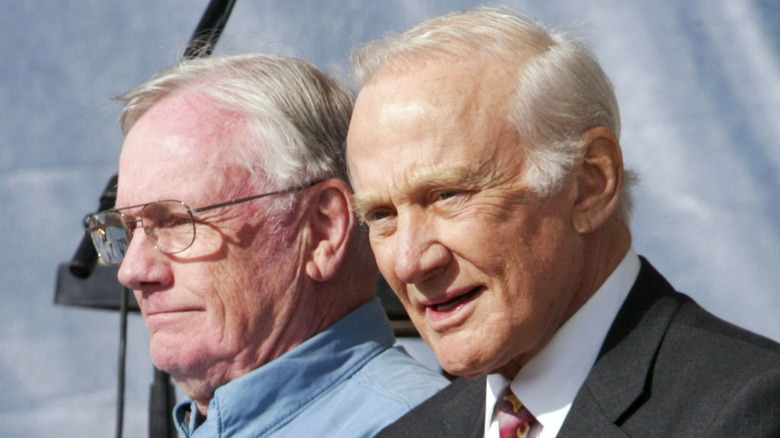
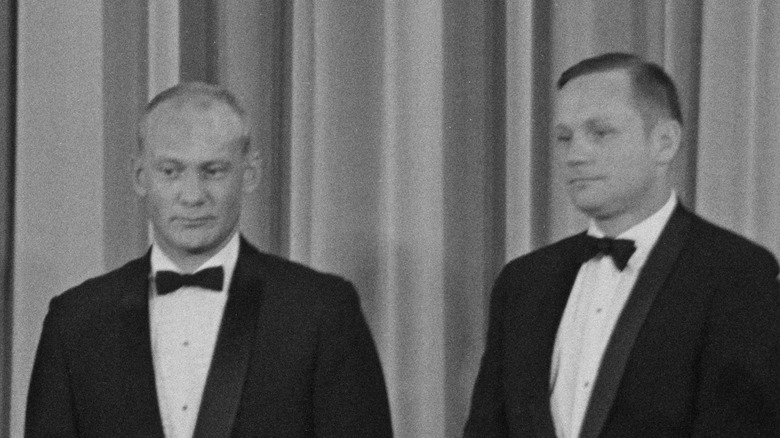
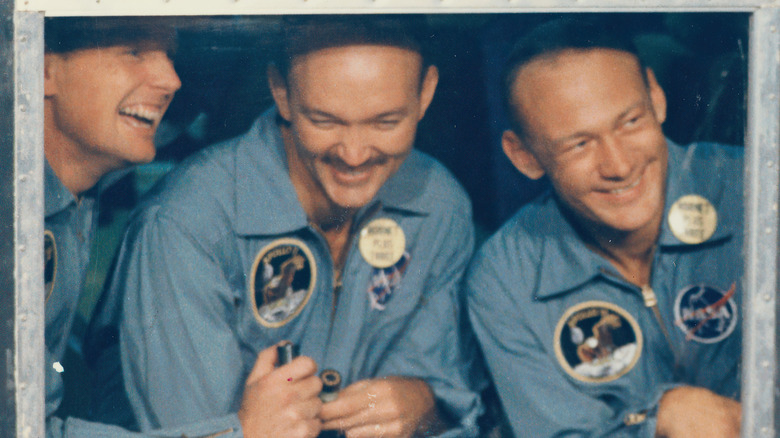
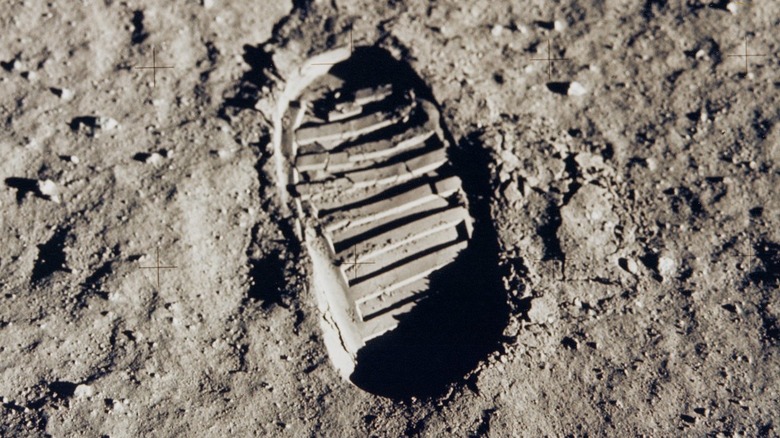
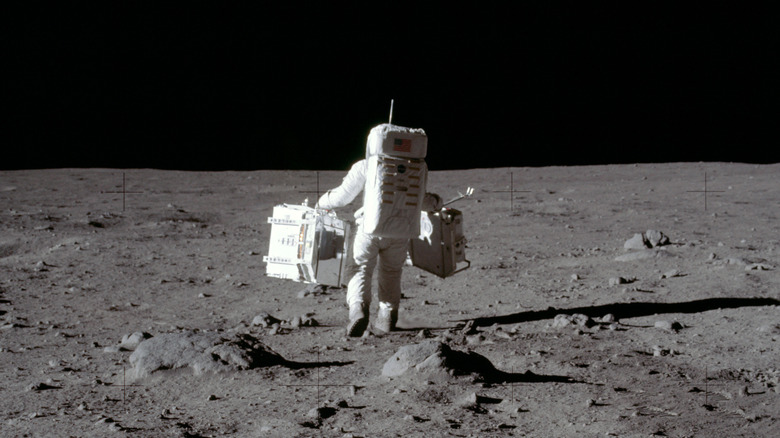
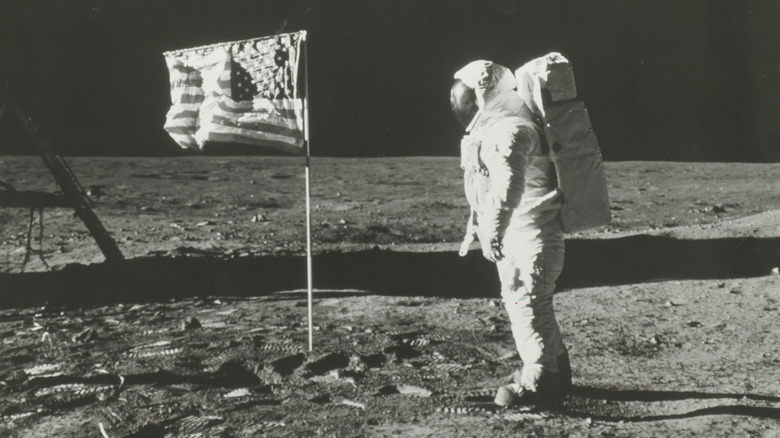
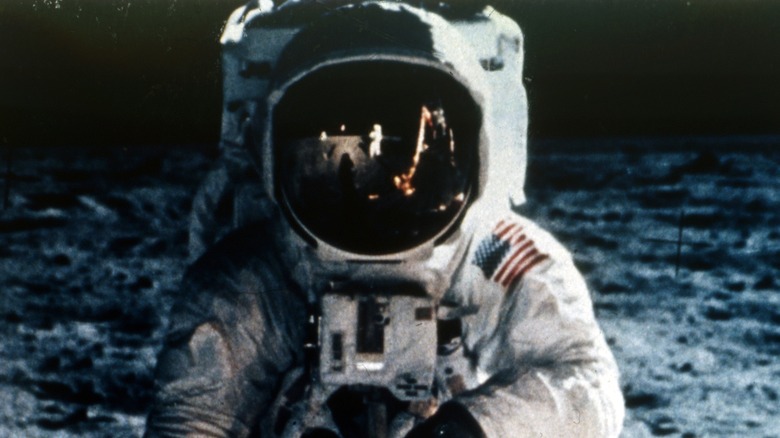
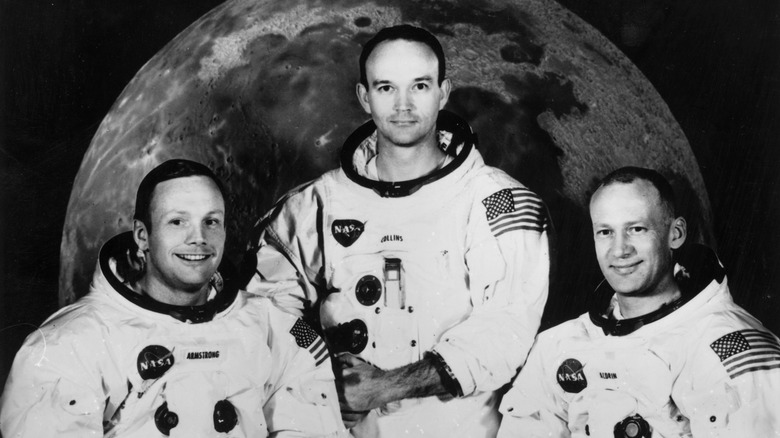
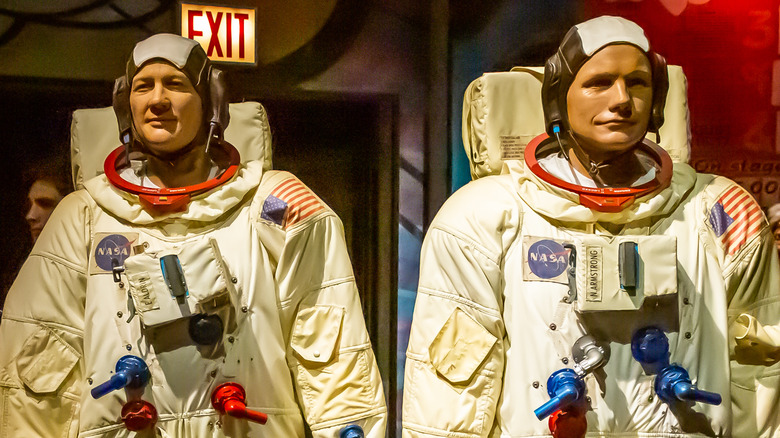
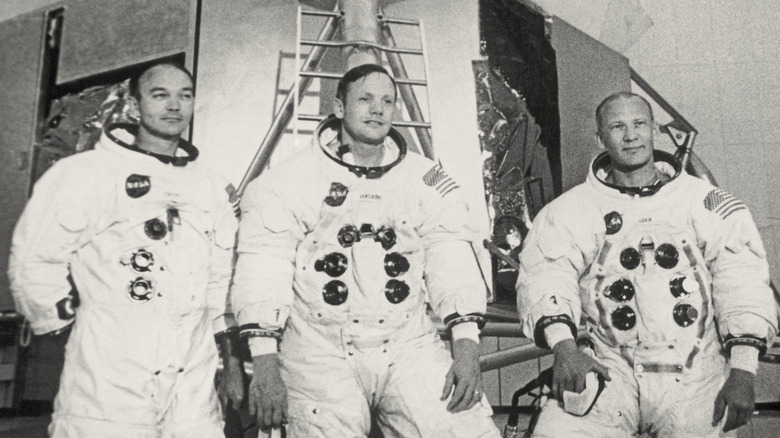
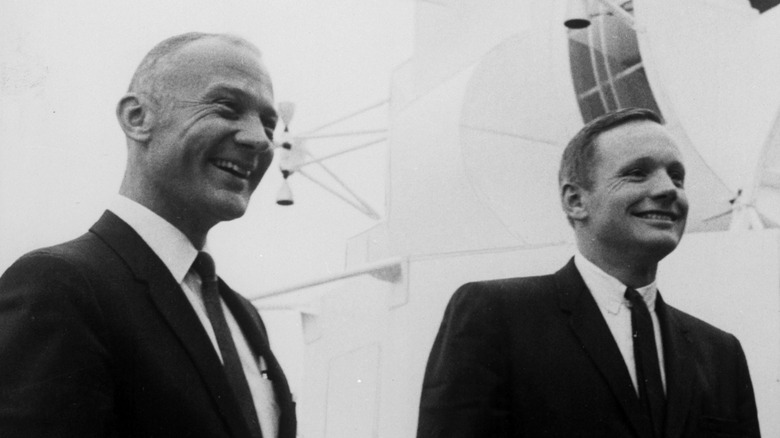
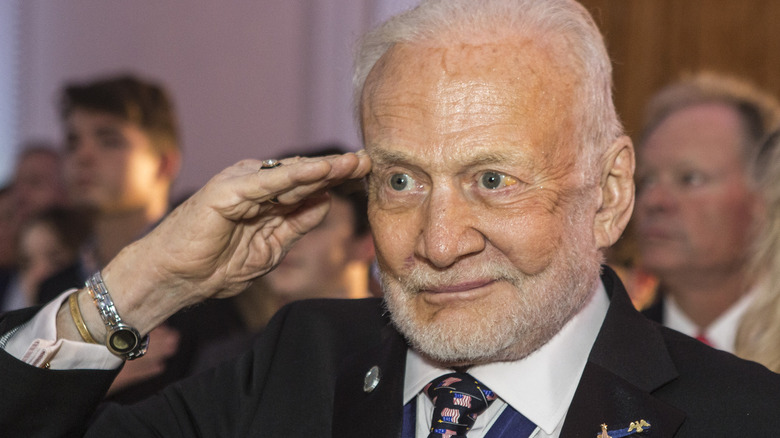
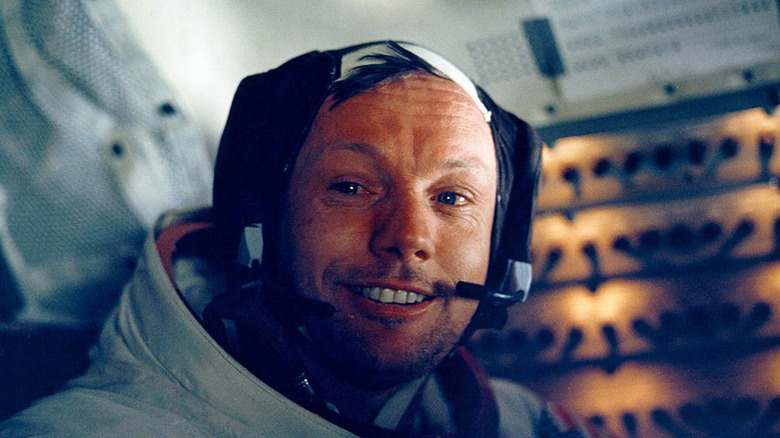
Belum ada Komentar untuk "When Did Neil Armstrong Get Married Again"
Posting Komentar